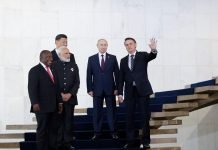The return of the Pichichi to the Government, and as a candidate: Massa suffers it!
What Daniel Scioli used to say about Alberto Fernández in Kirchner’s government: «I don’t get involved in the internal affairs of the bedroom».

The new minister was vice-president while the current president was Chief of Staff. Both were leaders of the PJ porteño and an election marked differences between them. They meet again in government 17 years later.
The bond between Alberto Fernández and his next Minister of Production, Daniel Scioli, began in the 90’s within the Justicialist Party and was solidified in 2003, in the government of Néstor Kirchner. Fernández as Chief of Cabinet and Scioli as Vice President. What did the new official say about the current President in November 2005?
In an interview with PERFIL, the then vice-president said that his relationship with Alberto Fernández is «correct, mature and responsible». Those three words he chose to describe him. Even, the interviewer, Marcelo Dimango, clarified that the answer was «(annoying and cutting)».
The controversy at that time was that Scioli had not supported former Chancellor Rafael Bielsa in the Buenos Aires campaign against Mauricio Macri. Scioli did not deny those frictions with Buenos Aires albertismo, which defended Bielsa.
Alberto Fernández and Daniel Scioli 20220607
«The truth is that I don’t get involved in political bickering. I have never wasted time in these intrigues», answered the current ambassador to Brazil, who next week will take over the leadership of the Ministry of Productive Development after the departure of Matías Kulfas.
In response to the journalist’s question, he remarked: «Many times they may let some things transcend to try to bother me, but my passion for the country will not decline because of that. On the contrary, these rumors strengthen me». Besides, he stressed that he «does not waste time». «I don’t get involved in the internal affairs of the bedroom».
Scioli takes office next week
Seventeen years passed from those political definitions between Scioli’s link with Fernández. In 2019 the President chose him as Argentine ambassador to Brazil, an arduous task due to the political link with Jair Bolsonaro.
After the departure of Matías Kulfas from the Ministry of Productive Development, the President, together with Sergio Massa and Cristina Kirchner, resolved to summon him for the vacant position. Thus, next week, when Fernández returns from the Summit of the Americas, he will be sworn in and a new chapter will be written in the bond between both leaders.
What about?…
The appearance of Scioli on the scene after the departure of Kulfas, far from bringing concord to the Frente de Todos, looks like a short sheet that has to take Massa’s peace to achieve Cristina’s peace.
Consultant specialized in Institutional and Political Communication, Public and Governmental Affairs, Crisis Management and Media Relations. Master in Communication and Political Marketing at Universidad del Salvador (USAL). Postgraduate Business and Management at the University of California, Berkeley, USA. He is a university professor at UCA and USAL.

On Tuesday, May 31, Argentina’s official website published «Kulfas: ‘After 50 years, naval sheet metal is produced again in Argentina'» and thus announced the former Minister of Productive Development the launching of the production of sheet metal for naval use of the company Laminados Industriales in Santa Fe. He then toured the industrial plant of Sidersa, in San Nicolás, which will soon expand its plant and create more than 1,800 jobs. Everything seemed to be going normally until then and harmony seemed to be coming to the Frente de Todos after the new attempt of harmony in the joint conference of Alberto and Cristina in Tecnópolis for the 100 years of YPF.
The off revealed was the excuse that the Frente de Todos was looking for to test the places that rearranged the tense calm of Alberto and Cristina’s reunion. But the victims of this war seem to be just beginning to be seen, because there is a tired cabinet, divided, without direction and without aspirations that are officialism but speak as opposition as if they were a coalition between opponents and officialists.
Alberto Fernández confuses instead of clarifying
It is clear why Cristina asked Alberto for the minister’s head: because he was a friend and one of the staunchest defenders of albertismo. But why did the president remove Kulfas? The truth is that it all sounds very sloppy because it is not understood how Kulfas and his people can put such information in an off that is recorded in WhatsApp, especially because it seems to be far from correct. It seems either a desperate attempt by the minister to be kicked out or a sign of his political innocence that he does not realize how are the members of the alliance with whom he decided to confront. But beyond suspicions and suspicions, it is more important than all possible interpretations to think that it was another act of weakness of Alberto Fernandez, who once again was shown a card and quickly showed his game and went to the deck so as not to be retained, determined to eliminate any possible outbreak of albertismo. As if he had grown tired of going backwards for so long, Alberto now tires in the game without even warming up.
Kulfas seems to have suddenly forgotten his idea of focusing on management and got fully involved in the game of Cristina and her allies in which they are veterans and of which the now ex-minister seems not even to know the rules. Trapped by this logic, like the whole government, they seem to forget that there is a fundamental need here, which is to finish the gas pipeline in order to find ways to solve the energy problems and above all to take advantage of the window of opportunity given by the tragedy of the war. The work is so important that neither Cristina, nor the President, nor Kulfas could ignore that in Argentina there is no 3.6 inch plate because it is not profitable, in a country whose heavy industry works discontinuously, to have a 3.6 inch steel processing plant. This occurs in Brazil because this country has a large production of ships, airplanes, pipes fed by the demand produced by the scale of Brazil’s economy. In Argentina these products are only required when there are very large infrastructure works, which has not happened for a long time and when it did happen it was temporary. For this reason, what Cristina proposed regarding Techint setting up in Argentina to produce it, would be a great investment of money with a negative profitability or at least very scarce and discontinuous.
ARGENTINA CONTINUES TO BE A BOX OF SURPRISES. THERE IS NO POLITICIAN WITHOUT DIAPERS, BUT AT LEAST ONE POLITICIAN WHO COMES FROM THE PRIVATE SECTOR… WE WILL SEE





